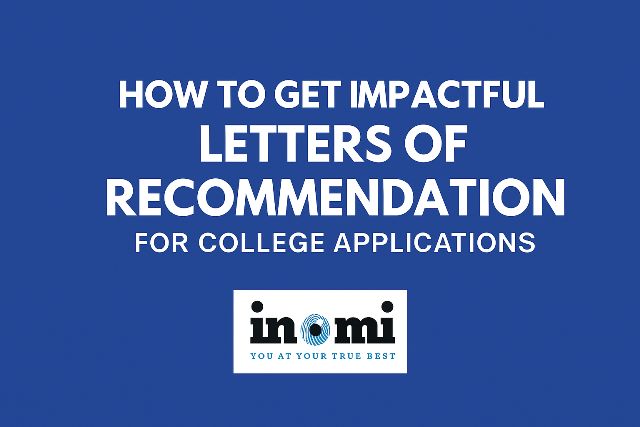
Letters of Recommendation (LORs) are a significant component of your college application, particularly for students applying to the U.S., U.K., and Canada. LORs enable admission officers to get to know you better than through your grade reports and test scores — from the perspective of your teachers, mentors, or school guidance counselors. Indeed, more than 350 U.S. colleges and universities make teacher and counselor recommendations a requirement via services such as the Common App. These letters can frequently serve the same purpose as an interview — presenting a genuine, third-party assessment of your strengths, character, and potential.
Why Letters of Recommendation Matter?
A thoughtful recommendation letter provides colleges with a glimpse of the actual you — your thought patterns, your ability to work with others, problem-solving skills, and impact on your classroom or community. Your essays and accomplishments speak for you, while LORs confirm your story in someone else’s voice.
Admissions officers would like to know:
- How well your recommender knows you
- Concrete instances of your impact and development
- And how do your strengths align with the values of their institution?
For highly competitive colleges, strong letters of recommendation can even sway the decision in your direction when your application is being weighed against other strong candidates.
What Makes a Strong Letter of Recommendation?
An excellent LOR avoids vague praise such as “She’s a hard-working student.” Rather, it creates a vivid, detailed portrait of you in action.
Strong LOR Example:
Rather than writing “Riya loves literature and is an outstanding student“, a more powerful statement would be: “Riya possesses a remarkable talent for making connections between literary themes throughout eras. Her comparative essay on self-sacrifice in Hemingway and Steinbeck demonstrated an analytical richness that is uncommon in high school students.”
This type of detail enables admissions officers to see your intellectual curiosity and how you differentiate yourself from others.
Tip: Greatest letters of recommendation reinforce and reinforce what you’ve already discussed in your activities list or essays.
For instance, if your Common App essay discusses spearheading a science club project, your recommender could explain how you inspired your fellow members and managed obstacles during that project.
When to Ask for a Letter of Recommendation?
Don’t wait until the eleventh hour! Counselors and teachers typically have dozens of recommendation requests in addition to their usual school duties.
- For Early Action/Early Decision candidates: Ask in July or August, before the school term is frantic.
- For Regular Decision: Ask by no later than October.
- Provide your teachers with at least 3–4 weeks for them to write and send their letters.
The sooner you ask, the better your recommender can write a considered and individualized letter.
Who Should You Ask for a Recommendation?
1. Teachers (Academic Recommenders)
Most colleges require one or two teachers’ recommendations. Select teachers who: Recently taught you (preferably in Grade 11 or 12). Know you academically and personally. Teach the core subjects such as English, Math, Sciences, or Social Studies. Don’t select recommenders from the same subject. For instance, if your two recommenders are both English teachers, then your application may be too focused. Colleges get to appreciate your strengths from different subjects.
2. School Counselor (Guidance or Career Counselor)
If there is a counselor at your school, they typically provide a separate letter about your personality, academic development, and service to the school community. This letter usually offers background information regarding your school — grading system, curriculum, and extracurricular activities — to enable admissions officers to assess your performance accurately.
3. Other Recommenders (Optional)
Certain colleges permit or recommend a second recommendation — from an employer, coach, mentor, or club advisor. Select someone who can share unique details regarding your leadership, creativity, or initiative outside the classroom. Always verify the college’s requirements before submitting additional letters.
How to Approach Your Recommenders?
After you’ve decided on your recommenders, contact them politely and personally — in person if you can, or by a well-crafted email if that is not possible.
Do the following:
1. Give Your Resume and Personal Statement
Give them a brief resume detailing your most important academic achievements, extracurricular activities, leadership positions, and awards. Also include a copy of your draft of your personal statement or essays. This allows your recommender to match their letter with your overall story.
2. Discuss Your College and Major List
Inform your recommender about the colleges and programs you’re applying to. For instance, if you’re applying to engineering schools, your teacher can highlight your problem-solving and analytical skills.
3. Outline Key Points or Themes
Let your recommender know what aspects you’d like them to emphasize — such as intellectual curiosity, teamwork, or perseverance.
Example: “Would you mind pointing out how I’ve grown in your class and helped with group projects — I believe that indicates my learning curve and teamwork.”
4. Give Context and Examples
Make your teacher remember a particular project, paper, or class discussion that reflects your strengths. The more specific examples they can use, the more real their letter will be.
For Indian Students: What If Your School Doesn’t Have a Counselor?
Most Indian schools, particularly CBSE or State Board schools, do not have professional counselors or might be inexperienced with the concept of recommendation letters.
Here’s what you can do in such a case:
Select the Correct Recommenders
Select two teachers from core courses who taught you recently. One can highlight your academic intensity and the other your personal traits or co-curricular involvement.
Define the Purpose
Explain politely that the letter is not a “certificate,” but a comprehensive testimonial of your learning attitude, teamwork, initiative, and integrity. Provide examples or templates (available on the Common App website) to guide them on what format to expect.
If There’s No Counselor
Some schools permit the Principal, Vice-Principal, or Head of Department to act as the counselor recommender. Their letter may contain details about the school (grades, grading scale, extracurricular activities) and your overall character and influence.
Provide Advice Without Writing It Yourself
You can give them bullet points, but do not write the letter for them. Colleges are generally able to sense when a student is writing his or her own recommendation — it takes away from credibility.
Final Tips for Handling the Recommendation Process
Waive Your Right to See the Letter:
When you’re submitting your applications, you’ll be asked if you waive your right to read the recommendation. Always respond “Yes” — this assures admissions officers that the letter is truthful and credible.
Confirm Submission Details:
Double-check that your recommenders know the correct email and how to send (e.g., through the Common App or a university portal).
Monitor and Follow Up Cordially
Monitor your application portal to see if the letters are taken in. If there is an impending deadline, remind your recommender politely a week beforehand.
Once your letters are in, thank your recommenders — in person or by email. Later, when you have your college acceptances, offer them an update and a thank you.
Small gestures count.
The Bottom Line
Letters of recommendation are not just a nicety — they’re a bridge between who you are in class and how you will contribute to building a college community.
By choosing the appropriate recommenders, properly preparing them, and being respectful of their time, you can have your LORs become an effective supplement to your essays and application.
So start early, be organized, and remember: the best recommendations are from genuine relationships built over time — not at the eleventh hour.”.
Tanmoy Ray is an experienced admissions consultant and content marketer with a passion for helping students achieve their global education dreams. After completing his Master’s degree in the UK, he worked with leading universities including the University of Oxford (UK), Utrecht University (Netherlands), and the University of New South Wales (Australia). Tanmoy combines his deep expertise in higher education with a talent for crafting student-focused resources that simplify complex admissions processes.
